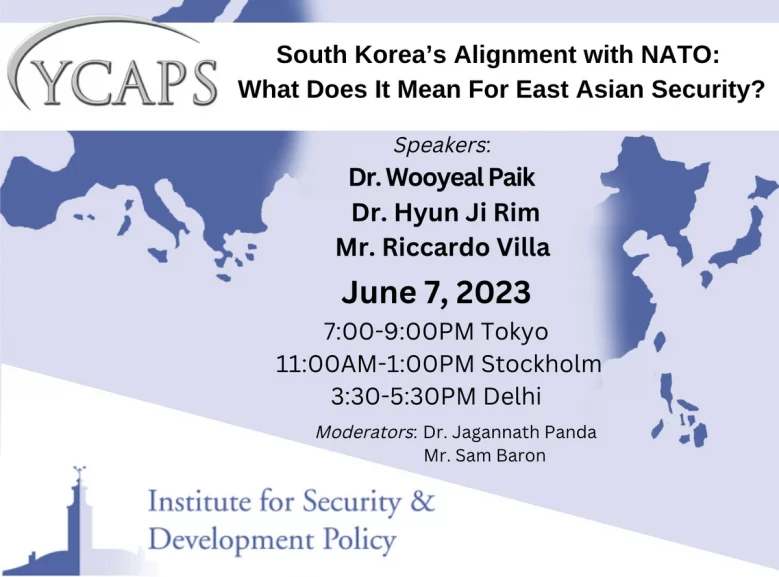South Korea’s Alignment with NATO: What Does It Mean For East Asian Security?

Since 2005, South Korea has been an active partner of the North Atlantic Treaty Organization (NATO). Built on shared values, the Seoul-NATO partnership has quickly become a strong one, especially in the cyber domain, with South Korean experts recently participating in the NATO Centre of Excellence and NATO Cyber Coalition exercise. Recent months have also seen a growing chemistry between NATO and its partners in the Indo-Pacific, with the recent announcement that the organization would open its first representative office in Asia.
In June 2022, the newly-elected South Korean President, Yoon Suk-Yeol, participated in the NATO summit, even holding a meeting with US President Joe Biden and Japanese Prime Minister Fumio Kishida following their decision to resume trilateral military exercises. For Yoon, the meeting with the countries’ European partners was a step forward in his quest to turn South Korea into a global pivotal state. He announced Seoul’s decision to establish a diplomatic mission at the NATO’s Brussels headquarters – demonstrating his commitment to pursue a more institutionalised and consistent dialogue with the Alliance. Yoon’s trip – as well as his other moves like joining international sanctions on Russia and sending $100 million in aid to Ukraine – positioned the country as an important
fellow liberal democracy eager to cooperate on strengthening the rules-based order.
A strong South Korea-NATO partnership holds positive prospects for both sides. For Seoul, a closer alliance with NATO can help bolster its defence, including against new age threats like cyber-attacks, climate change, supply chain challenges, and North Korea’s rapidly growing arsenal of missiles and nuclear weapons. For NATO, building a closer partnership with South Korea gives it critical access to the country’s defence industry, which can give it an edge vis-à-vis Russia. In the Indo-Pacific, this would naturally result in a stronger, more active Seoul – as well as a more engaged Europe – in addressing today’s complex security environment.
Although joining NATO as a member is not in the cards for either actor, such a robust defence partnership in the Indo-Pacific between the two ‘partners across the globe’ can nevertheless be beneficial for both parties, with them supporting each other’s capabilities, enhancing interoperability through regular military interactions and standardisation of logistics, and other wider cooperation for the maintenance of peace and security in the Indo-Pacific region.
Against this backdrop, the joint YCAPS-ISDP webinar will address the following questions:
- What does South Korea’s strategic alignment with NATO mean for East Asian security?
- What implications will South Korea’s closer affinity with NATO mean for Korea-Japan relations?
In order to discuss some of these questions, YCAPS’s Europe Chapter at the Stockholm Center for South Asia and Indo-Pacific Affairs (SCSA-IPA) of the Institute for Security and Development Policy (ISDP) will host Prof. Wooyeal Paik of Yonsei University in South Korea, Dr. Hyun Ji Rim of Johns Hopkins SAIS, and Mr. Riccardo Villa of the ISDP.
This is the third event in the Europe-Asia Webinar Series hosted by YCAPS’ Europe Chapter at the Stockholm Centre for South Asia and Indo-Pacific Affairs (SCSA-IPA) of the Institute for Security and Development (ISDP) in Stockholm, Sweden.
Please use this link to register via Zoom.
You will need the link and passcode provided in the confirmation email
Speakers:
Dr. Wooyeal Paik is an Associate Professor at the Department of Political Science and International Studies; Deputy Director at Yonsei Institute of North Korean Studies; and Director, the Center for International Relations, Aerospace Strategy & Technology Institute at Yonsei University in Seoul, South Korea. Dr. Paik is also a Visiting Fellow at Institut de recherche stratégique de l’École militaire (IRSEM), Paris and an Adjunct Professor at Vrije Universiteit in Brussels, Belgium.
Dr. Hyun Ji Rim is Adjunct Professor at the Johns Hopkins University’s School of Advanced International Studies (SAIS) and a Non-Resident Scholar at SAIS’s Edwin O. Reischauer Center for East Asian Studies. She also is a Research Associate at University of Missouri—Kansas City and an adjunct lecturer at Kansas State University. She writes extensively on extended deterrence, Indo-Pacific strategy, East Asian security dynamics, emerging technologies, and alliance politics. Her writings have appeared in Pacific Review, Journal of Indo-Pacific Affairs, Asian Perspective, International Journal of Conflict Management, and International Journal of Korean Unification Studies, among others. She edited and contributed to a forthcoming book from Routledge titled Indo-Pacific Strategy and Foreign Policy Challenges. She has held research fellowships with Fletcher School of Law and Diplomacy at Tuft University and Pacific Forum. She received her PhD in international relations from Johns Hopkins SAIS and her master’s degree in international relations from Korea University.
Mr. Riccardo Villa is a Project Coordinator at the Institute for Security and Development Policy. He holds a Master of Arts in Global Peace, Security, and Strategic Studies from Vesalius College in Brussels, Belgium, as well as a bachelor’s degree in Languages, Cultures and Societies, specializing in the Indian Subcontinent and Northeast Asia, from Ca’ Foscari University, Italy. Mr. Villa has had the opportunity to study in both Seoul, South Korea and in Xi’an, China, where he developed his knowledge of Northeast Asian relations, particularly in regard to the Korean Peninsula. His security policy background compliments a research portfolio which includes peace theory and geopolitics, humanitarian and development assistance, as well as human trafficking issues.
Webinar Cost: Free of charge
Chair: Dr. Jagannath Panda, ISDP
Co-Chair: Mr. Sam Baron, YCAPS
Format: This event will be on-the-record. Questions are encouraged. It will be recorded.
Registration: Required via this link.
Co-Sponsor: Institute for Security and Development Policy (ISDP)